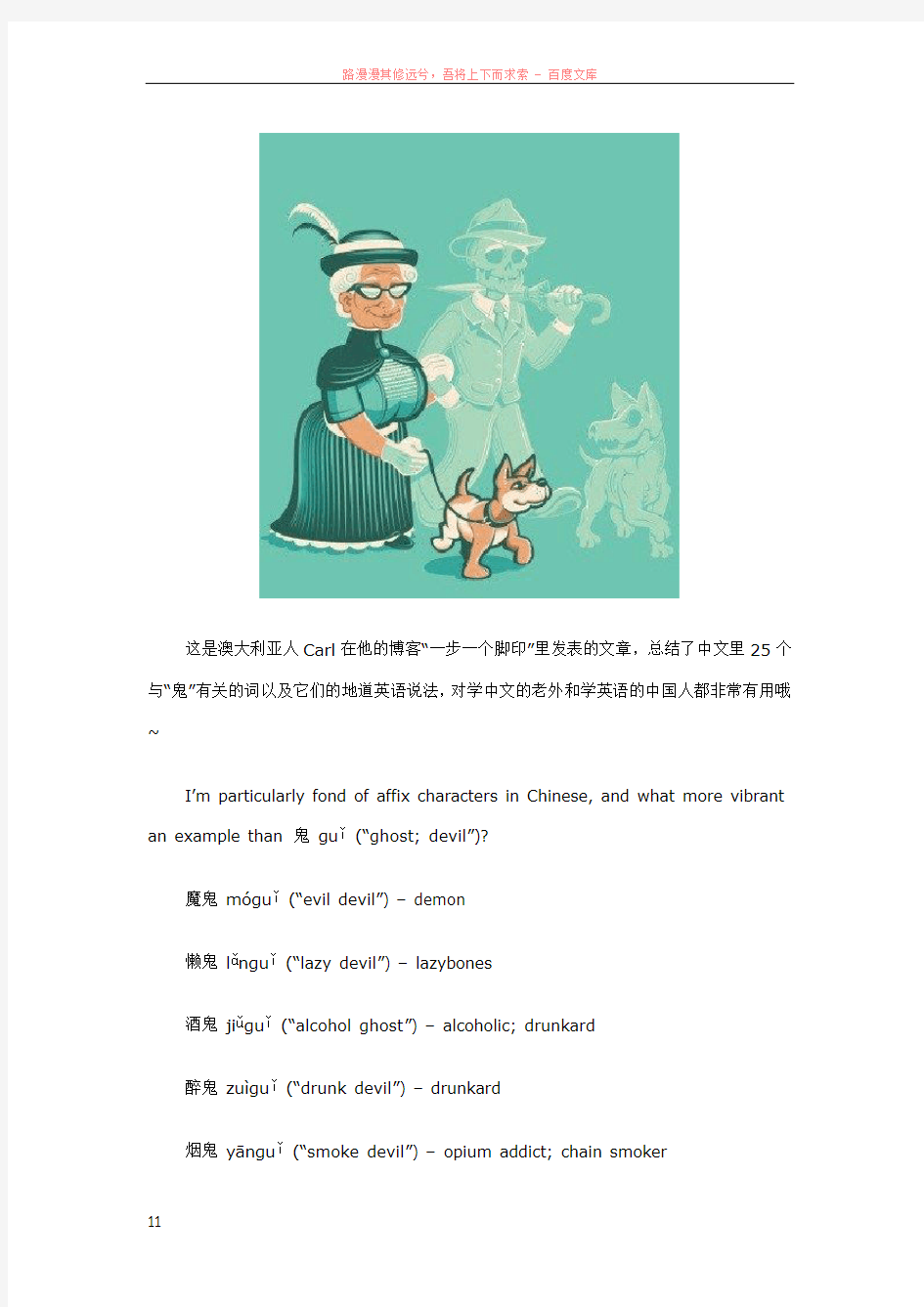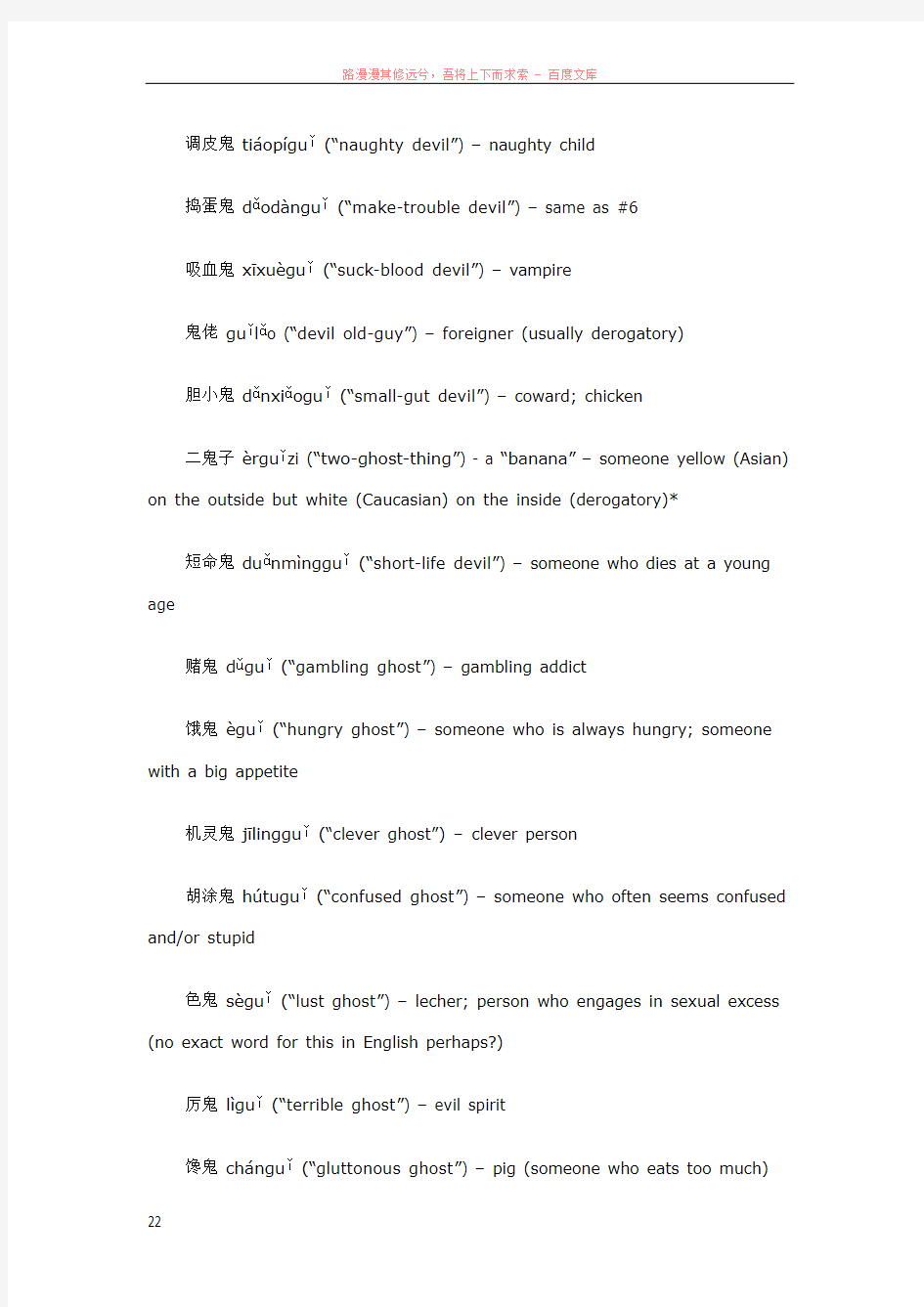英语单词趣谈:25个与“鬼”有关的词汇.


这是澳大利亚人Carl在他的博客“一步一个脚印”里发表的文章,总结了中文里25个与“鬼”有关的词以及它们的地道英语说法,对学中文的老外和学英语的中国人都非常有用哦~
I’m particularly fond of affix characters in Chinese, and what more vibrant an example than 鬼guǐ(“ghost; devil”)?
魔鬼móguǐ(“evil devil”) – demon
懒鬼lǎnguǐ(“lazy devil”) – lazybones
酒鬼jiǔguǐ(“alcohol ghost”) – alcoholic; drunkard
醉鬼zuìguǐ(“drunk devil”) – drunkard
烟鬼yānguǐ(“smoke devil”) – opium addict; chain smoker
调皮鬼tiáopíguǐ(“naughty devil”) – naughty child
捣蛋鬼dǎodànguǐ(“make-trouble devil”) – same as #6
吸血鬼xīxuèguǐ(“suck-blood devil”) – vampire
鬼佬guǐlǎo (“devil old-guy”) – foreigner (usually derogatory)
胆小鬼dǎnxiǎoguǐ(“small-gut devil”) – coward; chicken
二鬼子èrguǐzi (“two-ghost-thing”) - a “banana”– someone yellow (Asian) on the outside but white (Caucasian) on the inside (derogatory)* 短命鬼duǎnmìngguǐ(“short-life devil”) – someone who dies at a young age
赌鬼dǔguǐ(“gambling ghost”) – gambling addict
饿鬼èguǐ(“hungry ghost”) – someone who is always hungry; someone with a big appetite
机灵鬼jīlingguǐ(“clever ghost”) – clever person
胡涂鬼hútuguǐ(“confused ghost”) – someone who often seems confused and/or stupid
色鬼sèguǐ(“lust ghost”) – lecher; person who engages in sexual excess (no exact word for this in English perhaps?)
厉鬼lìguǐ(“terrible ghost”) – evil spirit
馋鬼chánguǐ(“gluttonous ghost”) – pig (someone who eats too much)
催命鬼cuīmìngguǐ(“prodding ghost”) – someone who keeps pushing people to do things; a nagger
死鬼sǐguǐ(“dead ghost”) – a negative but playful term used between spouses
鬼子guǐzi (“devil-thing”) – foreign devil (derogatory)
鬼怪guǐguài (“ghost-monster”) – ghosts and monsters
见鬼jiànguǐ(“see ghost”) – go to Hell!
鬼知道guǐzhīdào (“ghost knows”) – Heaven knows!
趣谈地名中的词汇知识
龙源期刊网 https://www.360docs.net/doc/cc15426524.html, 趣谈地名中的词汇知识 作者:钱伟 来源:《英语学习》2017年第11期 欧美有很多城市的名字中带“堡”(burgh)这个字,特别是在英国、法国、德国、荷兰、 北欧、南非等“法兰克-日耳曼”体系及受其文化影响的国家很常见,一抓一大把。例如欧洲小 国卢森堡(Luxembourg)、英国的爱丁堡(Edinburgh)、法国的斯特拉斯堡(Strasbourg)、俄罗斯的圣彼得堡(St. Petersburg)以及德国的汉堡(Hamburg)、纽伦堡(Nurnberg)、海 德堡(Heidelberg)、勃兰登堡(Brandenburg)、瑞典的哥德堡(Goteborg)、荷兰的米德尔堡(Middleburg)、奥地利的萨尔茨堡(Salzburg)、美国的匹兹堡(Pittsburgh)以及南非(曾是荷兰殖民地)的最大城市的约翰内斯堡(Johannesburg)等等。有意思的是“burg”、“burgh”、“bourg”、“berg”长得都很像,可以算是一家子(其实它们还有一个英语远亲叫做“fort”)。它们的共同祖先来自于古日耳曼语词根“bergaz”,也就是今天日耳曼语中的“berg”,意思是“山丘”、“高地”和“城堡”(这个词根至今还留在英语冰山“iceberg”一词中),原因在于古代筑城选择居高临下的高地,具有易守难攻的军事价值,于是这种类型的城市的特称便逐渐成了泛称。 英语中也有些常见地名是以“ia”或“a”等名词后缀结尾的,表示“之国”、“之地”。这多是常见于西班牙或意大利等拉丁语区或是根据希腊语和拉丁语习惯命名的地区。与此有关的地名数不胜数。比如Asia(亚洲)、Africa(非洲)、America(美洲)、Arabia(阿拉伯)、Australia(澳大利亚,意为“南方之地”)、Liberia(利比里亚,意为“自由之国”)、Romania (罗马尼亚,意为“罗马人之国”)、Estonia(爱沙尼亚)、Latvia(拉脱维亚)、Bulgaria(保加利亚)、Slovenija(斯洛文尼亞)、Valencia(瓦伦西亚,西班牙第三大城市)等。需要说明的是英语中地名词尾“nesia”是由希腊语“nesos(岛屿)”和词尾“ia” 合成的,意思是“海岛之国”。例如Indonesia(印度尼西亚,意为“印度群岛”)、Polynesia(波利尼西亚,“波利”是希 腊语词根“polys”,意为“很多”)、Micronesia(密克罗尼西亚,“密克罗”是希腊语词根“mikros”,意为“微小”)、Melanesia(美拉尼西亚,“美拉”来自希腊文“melas”,意为“黑色”),所以这几个词的字面意思分别是“印度群岛”、“多岛群岛”、“小岛群岛”和“黑人群岛”。 英语中还有些为数不少的地名是以“polis”结尾的。这和希腊语“polis”(城市,如英语中的“metropolis”就表示“大都市,大都会”)有关,与此相关的地名也不少。如:美国的Minneapolis(明尼阿波利斯)、Indianapolis(印第安纳波利斯)、加拿大的Annapolis(安纳波利斯)、巴西的Tunápolis(图纳波利斯)、利比亚的首都Tripoli(的黎波里)。按照“Tripoli”的字面意思(三个城市),其实中国的武汉(由武昌、汉口、汉阳三镇组成)也是典型的“Tripoli”。 英语中另一个常见地名后缀是“stan”(斯坦)。其直接来源是波斯语,最早可追溯到一个印欧语的共同词根“sta”,表示站立的意思(如“stand”)。这个词根在印欧语诸语言中有很多 变体。其在英文中的写法“stan”,意为“……之地”。其实和“stan”同源的词在欧洲语言中很常
经典幽默英语故事(30个)-(1)
经典幽默英语故事(50个) 要求: 1、每天阅读两篇小故事,写出故事大意,尽量理解故事里的幽默点。 2 3、开学后,请把这14页的阅读素材,装订成册,上交给各班的英语老师。老师会根据你的完成情况,给你的阅读作业打出分数。 姓名:_________ 班级:_________ 学号:_________ 成绩:_________ 第一篇 My First and My Last When George was thirty-five, he bought a small plane and learned to fly it. He soon became very good and made his plane do all kinds of tricks. George had a friend. His name was Mark. One day George offered to take Mark up in his plane. Mark thought, "I've travelled in a big plane several times, but I've never been in a small one, so I'll go." They went up, and George flew around for half an hour and did all kinds of tricks in the air. When they came down again, Mark was very glad to be back safely, and he said to his friend in a shaking voice, "Well, George, thank you very much for those two trips in your plane." Gerogy was very surprised and said, "Two trips?" "Yes, my first and my last," answered Mark. 故事大意: _______________________________________________________________________________ _______________________________________________________________________________ _______________________________________________________________________________ _______________________________________________________________________________第二篇 First Flight Mr. Johnson had never been up in an aerophane before and he had read a lot about air accidents, so one day when a friend offered to take him for a ride in his own small phane, Mr. Johnson was
(完整版)初中常见易混淆英语词汇
1.sound, voice, noise sound自然界各种各样的声音,voice人的嗓音,noise噪音I hate the loud noise outside. 2. exercise, exercises, practice exercise运动,锻炼(不可数),exercises练习(可数),practice(反复做的)练习take exercise 做运动 3. work, job 二者均指工作。work不可数,job可数a good job,What interesting work it is! 4. cook, cooker cook厨师,cooker厨具He is a good cook. 5. police, policeman police警察的总称,后接复数谓语动词,policeman 指某个具体的警察The police are questioning everyone in the house. 6. problem, question problem常和困难联系,前面的动词常为think about, solve, raise,question常和疑问联系,多和ask, answer连用 7. price, prize price价格,prize奖,奖品,奖金win the first prize The price is high/low. 8. a number of, the number of a number of许多,谓语动词用复数。the number of…的数目,谓语动词用单数。The number of students is increasing. 9. in front of, in the front of in front of范围外的前面,in the front of范围内的前面A boy sits in the front of the room. 10. next year, the next year next year将来时间状语,the next year过去将来时间状语 He said he would go abroad the next year.
跟校园有关的单词
freshman 大一学生 sophomore 大学二年级生, 有二年经验的 junior student 大三学生 senior student 大四学生,高年级学生undergraduate student 本科生 graduate student / postgraduate student 研究生master's degree 硕士学位 bachelor's degree 学士学位 doctor student / doctor candidate 博士研究生post doctor student 博士后 alumni / alumnus 校友 RA助研:research assistant; TA助教:teaching assistant teaching fellow 讲师 professor 教授 tutor / mentor / director / super visor 导师 dean 系主任 department 系 president 校长 staff 全体员工(商店、企业) faculty 全体教职员工 Counselor辅导老师) take the course 选课 drop the course 退课/翘课 register 注册 sign up for the course 选课 get a class permit得到听课证 take the notes记笔记 Pick up = learn cancel 取消 full 报满 selective course / elective course / optional course 选修课 requirement / required course / compulsory 必修课evening course curriculum extracurricular activities; barely stay awake 几乎不能保持清醒 beyond me 超出我的理解范围lecture 讲座 seminar 讨论班 credit 学分 literature, introductory course 初级课程advanced course 高级课程 math 数学 computer course 计算机 psychology course 心理学 physics 物理学 economics 经济学 computer science 计算机科学 sociology 社会学 geology 地质学 chemistry 化学 biology 生物学 biochemistry 生物化学 science 理科 data processing 数据处理 computer programming 计算机程序 homework / assignment / project book report 读书报告 presentation (针对某一专题进行的发言/课堂报告) reading list 书单 reading assignment阅读作业 cover a few chapters 涉及了几个章节intensively 精细地 turn in / hand in hand 上交 deadline 最后期限 due 到期 extension 延期 paper 论文/ essay 小论文 term paper 学期报告 thesis 毕业论文 proposal 开题报告 composition 作文 textbook教科书 reference book参考书(07-6) copy 副本 hand in
20句趣味英语单词
20句趣味英语单词 1.american beauty是“月季”,而不是“美国美人”。 2.Dutch act是“自杀”,而不是“荷兰人的行动”。 3.Chinaberry是“ 楝树”,而不是“中国莓”。 4.China grass是“苎麻”,而不是“中国草” 5.Dutch door是“杂志中的散页广告”,而不是“荷兰门”。 6.Dutch uncle是“唠唠叨叮的人”,而不是“荷兰大叔”。 7.Dutch wife是“竹、藤睡具”,而不是“荷兰老婆”。 8.go Dutch是“各人自己付钱”,而不是“去荷兰”。 9.Take French leave是“不告而别”,而不是“请法国假”。 10.French letter是“避孕套”,而不是”法国信”。 11.Russia dressing是“蛋黄酱”,而不是“俄罗斯服装”。 12.a Greek gift是“害人的礼物”,而不是“希腊的赠品” 13.Malian iron是“圆筒形熨斗”,而不是“意大利铁”。 14.Spanish- athlete是“胡说的人”,而不是“西班牙运动员”。 1. One-two是“拳击中连击两次”,而不是“一二”。 2. two-time是“对人不忠”,而不是“两次”。 3. in two twos是“立刻”,而不是“两两之间”。 4. three-score是“六十”,而不是“三分” 5. four o'clock是“紫茉莉或食蜜鸟”,而不是“四点”。 6. four hundred是“名流、上层”,而不是“四百” 7. five-finer是“贼”,类似汉语的“三只手”,而不是“五指” 8. at sixes and sevens是“乱七八糟”,而和“六”无关。 9. tight-ball是“老实人”,这里的“八”和“发”无关。 10. to the tens是“打扮得极为华丽”,而不是“数到十” 11. a white day是“良晨吉日”,而不是“大白天”。 12. a white elephant是“沉重的负担”,而不是“白象”。 13. blue film是“黄色电影”,而和“蓝色”无关。 14. yellow hook是“法国***或议会的报告书”,而不是…黄色书刊” 15. green-eyed是“红眼病”,而不是“绿眼病” 16. green hand是“生手”,而不是“绿手” 17. green horn是“新移民”,而和“牛羊的角”无关 18. white lie是“善意的谎言”,而和“白色”无关。 19. green back是“美钞”,而不是“绿毛龟”. 20. yellow back是“法国廉价小说”,而不是“黄背”。
英语禁忌词汇
科技信息 SCIENCE &TECHNOLOGY INFORMATION 2012年第33期禁忌语(taboo ):taboo 一词起源于波利尼西亚汤加语,其汤加语的 拼写为tabu ,毛利语的拼写是tapu 。这个单词最早是在1771年英国探 险家James Cook 在汤加探险时从当地人那里学到的,并把这个单词 引入了英语。James Cook 在描述汤加人的文化习俗时写道:“Not one of them would sit down,or eat a bit of any thing....On expressing my surprise at this,they were all taboo,as they said;which word has a very comprehensive meaning;but,in general,signifies that a thing is forbidden.1”他还写道“When any thing is forbidden to be eaten,or made use of,they say,that it is taboo.2”根据《大英百科全书在线》,Taboo 一 词意义为“A taboo is a vehement prohibition of an action based on the belief that such behavior is either too sacred or too accursed for ordinary individuals to undertake,under threat of supernatural punishment.3” 禁忌语包含如下三个部分:称谓禁忌、词汇禁忌、话题禁忌。作为 禁忌语的一部分,词汇禁忌分如下几个类别:辱骂性词语(obscene ), 亵渎性词语(blasphemy ),贬损性词语(slur ),政治性错误的词汇 (politically incorrect words )。 禁忌语是一种语言现象,更是一种社会现象。与语言的其他部分 一样,禁忌语一方面是社会文化、价值观的反映,另一方面又受其限 制。具有普遍性,也有文化特定性和语境独立性。因此,对其研究必须 考虑具体的语境,文化背景,场合和活动,特别是参与者等语境因素的 影响。 辱骂性词语包括与人体性器官、性行为、排泄物有关的粗俗性词 语(vulgar words )如cock,shit,fuck 等。下面以“粪便,排泄物”为例,简 单解释。英语国家的医学课本在谈到人类的消化功能时,对于人类的 粪便一般使用“waste material ”这一中性词汇表示,避免了在课堂上讨 论这个话题引起的尴尬。而粪便的正式词汇是stool ,这个词一般在医 生和病人之间使用或者出现在医学报告中如:“The patient ’s stool was watery.”或“Take your stool sample to the laboratory for testing.”feces 也 是正式词汇,可以指人类的也可以指动物的粪便,受过良好教育的人 之间尤其常用这个词。Fecal matter 也是正式词汇,一般用于卫生检查 报告中,有暗示少量粪便的意思,如:“Fecal matter was found in the canned spaghetti sauce.”或“A certain amount of insect parts and rodent fecal matter is allowed in the food-canning process.”excrement 是通用 词汇,指人类或者动物的粪便。bowel movement 也是一般词汇,在家庭 成员之间和与医生的交谈中使用是可接受的,但如果与邻居等使用则 显得过于直白,不礼貌。B.M 或b.m 是bowel movement 的委婉说法,在 与邻居等交谈的时候可以使用,但是,因为属于隐私,这个话题还应尽 量避免。caca 是幼儿使用的词汇,因为他们的语言能力还不完善,所以 在和父母家人交流时,使用这种发音容易的单词,类似的还有cackee, a a,eh eh,poop,poopie,poozie,doodoo 和doody 。Number two 是在学龄 儿童中常用的委婉语,如:“I have to go to bathroom.”“Do you have to do number one or number two?”“Number two.”Turd 被认为是粗俗的 (vulgar ),是可数名词,可以指人,猫,狗,鸟类的排泄物。如:“He flushed the turds down the toilet.”“The park was filled with dog turds.” dropping 是动物粪便的委婉语。如马粪(horse droppings),牛粪(cow droppings )。马粪还被幽默地称作road apples 。牛粪也被称作cow flop, cow pancakes,pasture patties ,而干牛粪是cow chips 。当马粪和牛粪被 用作肥料时,又被分别叫做dung 和manure 。Dirt 是猫、狗粪便的委婉 语。如:“People must clean up their dog ’s dirt.”dog doo 是狗粪的另一 种委婉说法。shit 是个粗俗的(vulgar )词,在礼貌地对话中没有人会用 到,但是这个词有很多的含义,在很多非正式的场合广泛使用,可以说 是英语口语里面最常见的词汇。 亵渎性词语是指根据宗教教义亵渎神灵的词语。根据基督教的教 义,滥用上帝的名字是不敬的,《圣经》申命记5:11写道“You shall not take the name of the LORD your God in vain,for the LORD will not hold him guiltless who takes His name in vain.”(Deuteronomy 5:11)(“不可妄称耶和华你神的名。因为妄称耶和华名的,耶和华必不以他为无罪。”)这类词语包括“God damn it!”,“Go to hell!”,“Jesus Christ!”,“Christ!”,“For Christ Sake!”,“Jesus!”,“God!”,“What the hell!”等。尽管是禁忌语,但是,在表示惊讶和愤怒的时候,仍然是最常用到的。也正因为是禁忌语的关系,有些人会用一些与这些单词发音类似的词语来代替他们,如:“Cripes!”,“Christmas!”,“For crying out loud!”,“Gee Whiz!”,“Jiminy Cricket!”,“Jeepers !”,“Cheese and crackers!”,“Golly!”,“Gosh!”,“Goldarnit!”,“Doggone it!”,“Heck!Go to heck!”,“What the heck!”等等。贬损性词语(slur )是指贬损他人的国籍或种族的侮辱性词汇或者是对某类人群如:女性、同性恋者、残疾人、儿童、老年人、胖人、矮个子的人、穷人等的贬损词汇。比如:kike ,wop ,nigger 等。这类词汇中某些带有强烈的歧视和攻击性,是要绝对避免使用的。但是,由于使用语境不同,即使对英语是本族语的人来说,对这类词汇的使用也不确定。例如有的词汇在某些地区是可接受的,而在某些地区却是侮辱性的。如:Yankee 这个词被大多数美国人接受的,认为是美国人的昵称,而在美国南方,Yankee 的意思是北方佬,因而,这个词被认为带有侮辱性。Canuck 意思是加拿大人或法裔加拿大人的意思,这个词在加拿大西部是被接受可以使用的,而在美国的东北部却认为是冒犯性、不礼貌的。对某个群体的称呼也会随着时间的改变,从正确变成不正确。如:alien ,外国人,这个词原来是可以接受的,但是,如今,在某些语境下被认为是冒犯性的,类似的还有foreigner 。Foreign student 这个称呼在上世纪80年代之前是可以接受的,后来,大学管理者们认为这个说法有冒犯性“It made students from other countries seem not to belong here.”基于这个原因,现在用international student 取而代之。然而,政府官方仍然使用foreign student ,同样,foreign service,foreign currency 和foreign diplomat 也仍在使用。不少词汇,也会随着时间的推移,社会文化的变迁,从一般性词汇变成侮辱性的粗俗词汇,而变得少有人使用或者被其他其他词汇代替。cock 是公鸡的意思,在俚语里(slang )是男性生殖器的意思,而这个意思被越来越多的人所知,最后,大多数人都不用这个单词来称呼公鸡了,现在公鸡被叫做rooster.从1300年到1900年左右,ass 都是驴的意思,尽管把某人称作驴是很不礼貌的,但在当时,ass 并不被认为是粗俗的词汇。arse-屁股,是一个粗俗的词汇,这个单词在英国某些地方经过了一段时间的发音变化以后,其拼写和发音变得和ass 一模一样了。换句话说,ass 当时有了两个意思,一个是礼貌的,一个是粗俗的。而如今,粗俗含义已经取代了礼貌的含义,现在ass 变成了一个彻彻底底的粗俗词汇。这个变化甚至在《圣经》不同时期的版本中都体现了出来,早期的英文版《圣经》Matthew21:5中写道“Behold,your king is coming to you,humble,and mounted on an ass.”而新版本的《圣经》则是“See,your king comes to you,gentle and riding on a donkey …”一个族群的人可以用贬损性的词汇称呼自己的族群,但是如果别人用这个词汇称呼自己的族群却被认为是侮辱。比如:nigger,当这个词由黑人族群之外的人使用时,带有强烈侮辱性,这个词是从negro 的发音演变来的,和奴隶制,谋杀,偏见等对美国黑人的歧视有联系,在美国英语中,黑人族群之外的人是要绝对避免使用的。而从另一方面来说,非裔美国人却可以和亲近的人自由使用这个词,通常发音也变成“niggah ”如:“Yo niggah,what ’s up?”其他族群的人如果受到黑人群体的欢迎并完全融入这个群体,也可以使用这个词汇。Nigger 在黑人口中,有时候也指“person ”,如:“Who ’s that nigger over there?”政治性错误的词汇(politically incorrect words ),这种词汇是指给那些性别、肤色、残疾、年龄等群体带来不公平感觉的词汇。这些词汇或许本身不带有任何贬损或侮辱意味,但是可能会给这些群体带来遭浅谈英语禁忌词汇 刘亚飞李灵芝石霞 (中国人民解放军第二炮兵工程大学士官职业技术教育学院山东青州262500) 【摘要】本文主要介绍了词汇禁忌语的类别、特点、形式,并通过具体的实例说明了词汇禁忌语在具体语境中的使用限制和特点,加强禁忌词汇的学习,对学习者在减少跨文化交际失误,增强跨文化意识,提高跨文化交际能力方面有着重要意义。 【关键词】禁忌语;禁忌词汇;文化 ○外语论坛○298
有关学校的英语单词
有关学校的英语单词1free education 免费义务教育(在新西兰)2compulsory education 义务教育(在中国)3public school /council school 公立学校 4private school 私立学校 5teachers college / normal school 师范学校6admissions office 招生办公室,招生办 7tuition 学费 8semester 学期 9school discipline 校纪,学校纪律 10assistantship 助学金 11scholarship 奖学金 12school uniform 校服 13monitor 班长 14classmate 同学 15young pioneer 少先队员,红领巾 16the student canteen 学生食堂 17students’ union 学生会 18schoolyard 校园 19campus (尤指大学的)校园 20playground 操场 21platform 讲台
22blackboard 黑板 23chalk 粉笔 24blackboard eraser / board rubber / chalkboard eraser 粉笔擦25examination n. 考试 26take / have an exam 考试 27cheat 作弊 28to cheat on exams 考试作弊 29impostor 冒名顶替者 30compulsory course 必修课 31elective course 选修课 32the Arts 文科 33the Sciences 理科 34textbook 教科书 35Chinese 语文 36mathematics / math 数学 37English 英语 38Physics 物理 39Chemistry 化学 40History 历史 41Geography 地理 42Biography 生物 43Politics 政治
超级爆笑的英语单词
超级爆笑的英语单词。English is a crazy language. 英语里有许多非常好玩的单词。它们的词意和表明上看起来的完全没有关系。 There is no egg in eggplant (1) nor ham in hamburger(2),neither apple nor pine in pineapple(3)。 鸡蛋和茄子没什么血缘关系;苹果和凤梨的长相差距很大。 English muffins(4) weren't invented in England or French fries(5) in France。 英式松饼的家乡不是英国;炸土豆条的发源地也不是法国。 Sweetmeats(6) are candies while sweetbreads(7),which aren't sweet, are meat。 蜜饯(sweetmeats)不是肉,是甜的;杂碎(sweetbreads)是肉,不是甜的。 We find that quicksand(8) can work slowly, boxing rings(9) are square and a guinea pig(10) is neither from Guinea nor is it a pig。 流沙其实流得很慢;拳击台是方形的;实验用的小豚鼠的老家不是几内亚,长相和猪属于两种型。 If a vegetarian(11) eats vegetables, what does a humanitarian(12) eat?
素食主义者吃蔬菜,人道主义者吃人(human)? How can a slim chance(13) and a fat chance(14) be the same, while a wise man(15) and wise guy(16) are opposites? 胖瘦截然相反,可后面跟着chance就都变成“机会渺茫”了;聪明人(wise man)改一个词,就沦落为自作聪明的人(wise guy)。 How can overlook(17) and oversee(18) be opposites, while quite a lot(19) and quite a few(20) are alike? Look和see是近义词,但oversee监视,overlook意思怎么就是忽视呢;A lot和a few是反义词,但与quite连用,怎么都表示很多的意思呢! When the stars are out(21),they are visible, but when the lights are out(22),they are invisible。 星星出来了,我们能看到它们;灯灭了,我们就什么也看不见了。 When you wind up your watch(23),you start it, but when you wind up an essay(24),you end it? 给表上发条,表就开始走了;wind up一篇文章,哈哈,文章到此结束啦。
关于校园的英语词语对话大汇总(最全)
Campus Catalogue Campus (1) 1. Terms (2) 2. Sentences and expressions (8) (1)Daily sentences and expressions (8) (2)Slogans in the library of Harvard University (13) 3. Conversations (13) Registration (13) Missed Class (14) At the library (14) Changing plans (15) Generalization After graduating from high school, students leave homes and start their lives in the campus. Campus is like a second family, where all students of different ages live together. In the campus, we can meet people from all around the country, even foreign students. For the first time, we have to take care of ourselves. Naturally, many boys and girls have a hard time adapting to the new environment. Therefore, if you want to know more about campus, please go on reading. The following gives you plenty of English words and expression you may want to use when it comes to campus.
英语词汇禁忌趣谈
英语词汇禁忌趣谈 摘要:本文主要介绍了词汇禁忌语的类别、特点、形式,并通过具体的实例说明了词汇禁忌语在具体语境中的使用限制和特点,加强禁忌词汇的学习,对学习者在减少跨文化交际失误,增强跨文化意识,提高跨文化交际能力方面有着重要意义。 关键词:禁忌语;禁忌词汇;文化禁忌语(taboo):taboo一词起源于波利尼西亚汤加语,其汤加语的拼写为tabu,毛利语的拼写是tapu。这个单词最早是在1771年英国探险家James Cook在汤加探险时从当地人那里学到的,并把这个单词引入了英语。James Cook在描述汤加人的文化习俗时写道:“Not one of them would sit down,or eat a bit of any thing.... On expressing my surprise at this,they were all taboo,as they said;which word has a very comprehensive meaning;but,in general,signifies that a thing is forbidden.1”他还写道“Whe n any thing is forbidden to be eaten,or made use of,they say,that it is taboo.2”根据《大英百科全书在线》,Taboo 一词意义为“A taboo is a vehement prohibition of an action based on the belief that such behavior is either too sacred or too accursed for ordinary individuals to undertake,under threat of supernatural punishment.3” 禁忌语包含如下三个部分:称谓禁忌、词汇禁忌、话题禁忌。作为禁忌语的一部分,词汇禁忌分如下几个类别:辱骂性词语(obscene),亵渎性词语(blasphemy),贬损性词语(slur),政治性错误的词汇(politically incorrect words)。 禁忌语是一种语言现象,更是一种社会现象。与语言的其他部分一样,禁忌语一方面是社会文化、价值观的反映,另一方面又受其限制。具有普遍性,也有文化特定性和语境独立性。因此,对其研究必须考虑具体的语境,文化背景,场合和活动,特别是参与者等语境因素的影响。 辱骂性词语包括与人体性器官、性行为、排泄物有关的粗俗性词语(vulgar words)如cock,shit,fuck等。下面以“粪便,排泄物”为例,简单解释。英语国家的医学课本在谈到人类的消化功能时,对于人类的粪便一般使用“waste material”这一中性词汇表示,避免了在课堂上讨论这个话题引起的尴尬。而粪便的正式词汇是stool,这个词一般在医生和病人之间使用或者出现在医学报告中如:“The patient’s stool was watery.”或“Take your stool sample to the laboratory for testing.”。feces也是正式词汇,可以指人类的也可以指动物的粪便,受过良好教育的人之间尤其常用这个词。Fecal matter也是正式词汇,一般用于卫生检查报告中,有暗示少量粪便的意思,如:“Fecal matter was found in the canned spaghetti sauce.”或“A certain amount of insect parts and rodent fecal matter is allowed in the food—canning process.”。excrement是通用词汇,指人类或者动物的粪便。bowel movement也是一般词汇,在家庭成员之间和与医生的交谈中使用是可接受的,但如果与邻居等使用则显得过于直白,不礼貌。B.M 或b.m是bowel movement 的委婉说法,在与邻居等交谈的时候可以使用,但是,因为属于隐私,这个话题还应尽量避免。caca是幼儿使用的词汇,因为他们的语言能力还不完善,所以在和父母家人交流时,使用这种发音容易的单词,类似的还有cackee,a a,eh eh,poop,poopie,poozie,doodoo和doody。Number two是在学龄儿童中常用的委婉语,如:“I have to go to bathroom.” “Do you have to do number one or number two?” “Number two.”。Turd被认为是粗俗的(vulgar),是可数名词,可以指人,
中文谐音巧背英语单词
中文谐音巧背英语单词 你也是用中文来记单词吗?赶紧来看看网友的无限创意的! 爆笑(1):警察跑累死 police,n,警察,音“跑累死”。警察的最终结局是“跑累死”,因为小偷可以选择休息,而警察不能,警察永远跟在多个小偷的后面。 爆笑(2):柴门出主席 chairman,n,主席,音“柴门”。柴门是寒门。寒门出孝子,也出主席。从柴门走出来的主席很多。 爆笑(3):饱死老板,饿死员工 boss,n,老板,音“饱死”。 worker,n,工人,音“饿客”。工人们不要不平衡,老板会撑而“饱死”,工人是“饿客”,饿,不一定死。或者说,饱死老板,饿死员工,与老板殊途同归。 爆笑(4):法官会“榨汁” judge,n,法官,音“榨汁”,又音“喳吱”。社会上有种说法“吃了原告,吃被告。”有些法官会“榨汗”,榨原告被告的油汁。法官喳喳吱吱时候,是在纠问式审判,现在是听判式,法官很少“喳吱”了。 爆笑(5):律师老爷 lawyer,n,律师,音“老爷”。有个被告叫律师老爷,忘了叫法官青天大老爷,法官非常生气。毕竞法官比律师说了算。 爆笑(6):阿哥累了 Ugly,adj,丑陋的,音“阿哥累”。阿哥累了,变得丑了,心灵美了,阿妹不离他走了。 爆笑(7):政委与神甫 commissar,n.,代表,政委,音“靠弥撒”。弥撒是天主教的一种宗教仪式,用面饼和葡萄酒表示耶稣的身体和血来祭祀天主。西方的军队有随军神甫,相当于政委吧,靠弥撒做思想政治工作吧。 爆笑(8):三克油送给你 thank,you。谢谢你。音“三克油”。解:三克油,送给你,略表谢意。礼物虽轻,谢意情浓。 爆笑(9):客套与套客 talk,v,谈话,谈论,议论,n ,谈话。音“套客”。解:中国人谈话先客套,外国人真接就套客,小心哪。 爆笑(10):抬之若爆,小心为妙
最容易被中国人误解的英语词汇
sporting house 妓院(不是“体育室”) dead president 美钞(上印有总统头像)(并非“死了的总统”) lover 情人(不是“爱人”) busboy 餐馆勤杂工(不是“公汽售票员”) busybody 爱管闲事的人(不是“大忙人”) dry goods (美)纺织品;(英)谷物(不是“干货”) heartman 换心人(不是“有心人”) mad doctor 精神病科医生(不是“发疯的医生”) eleventh hour 最后时刻(不是“十一点”) blind date (由第三者安排的)男女初次会面(并非“盲目约会”或“瞎约会”)p ersonal remark 人身攻击(不是“个人评论”) sweet water 淡水(不是“糖水”或“甜水”) confidence man 骗子(不是“信得过的人”) criminal lawyer 刑事律师(不是“犯罪的律师”) service station 加油站(不是“服务站”) rest room 厕所(不是“休息室”) dressing room 化妆室(不是“试衣室”或“更衣室”) horse sense 常识(不是“马的感觉”) capital idea 好主意(不是“资本主义思想”) familiar talk 庸俗的交谈(不是“熟悉的谈话”) black tea 红茶(不是“黑茶”) black art 妖术(不是“黑色艺术”)
black stranger 完全陌生的人(不是“陌生的黑人”) white coal (作动力来源用的)水(不是“白煤”) white man 忠实可靠的人(不是“皮肤白的人”) yellow book 黄皮书(法国政府报告书,以黄纸为封)(不是“黄色书籍”)red tape 官僚习气(不是“红色带子”) green hand 新手(不是“绿手”) blue stocking 女学者、女才子(不是“蓝色长统袜”) China policy 对华政策(不是“中国政策”) Chinese dragon 麒麟(不是“中国龙”) American beauty 一种玫瑰,名为“美国丽人”(不是“美国美女”)English disease 软骨病(不是“英国病”) Indian summer 愉快宁静的晚年(不是“印度的夏日”) Greek gift 害人的礼品(不是“希腊礼物”) Spanish athlete 吹牛的人(不是“西班牙运动员”) French chalk 滑石粉(不是“法国粉笔”) pull one's leg 开玩笑(不是“拉后腿”) in one's birthday suit 赤身裸体(不是“穿着生日礼服”) eat one's words 收回前言(不是“食言”) an apple of love 西红柿(不是“爱情之果”) handwriting on the wall 不祥之兆(不是“大字报”) bring down the house 博得全场喝彩(不是“推倒房子”) have a fit 勃然大怒(不是“试穿”)
